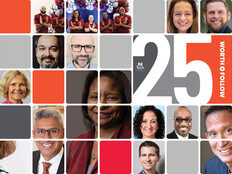What Would a Common Core for Higher Ed Look Like?
A pilot assessment that resembles Common Core state standards for higher education is brewing at 68 institutions across the country.
Universities in Connecticut, Indiana, Kentucky, Massachusetts, Minnesota, Missouri, Oregon, Rhode Island and Utah are participating in the Advance Learning Outcomes Assessment.
The assessment will analyze student data "using a common approach," George Pernsteiner, president of the State Higher Education Executive Officers Association (SHEEO), states in a news release.
“What our faculty learn from this work will help them improve teaching and student learning and will provide valuable and defensible information to show that students are learning, and what that learning means in terms of the understanding and skills needed to succeed in life," Pernsteiner said.
Work has been underway in a number of schools piloting the assessment. Faculty have been gathering student work and documenting how well the students are achieving learning goals such as “quantitative reasoning, written communication and critical thinking.” Also in development is a Web-based initiative to share this data among institutions, according to the release.
The initial planning for the work was supported with funding from the Bill & Melinda Gates Foundation.
“The Multi-State Collaborative is a very important step toward focusing assessment on the best evidence of all: the work students produce in the course of their college studies," Association of American Colleges and Universities President Carol Geary Schneider said in the release.
From SHEEO’s perspective, current student assessment methods, such as grading and standardized tests, fall short in accurately gauging the effectiveness of teaching. Part of the driving force in this collaborative effort is to design standards that all institutions can agree on when it comes to measuring success.
But Meris Stansbury, managing editor of eCampus News, said standardizing higher education student work could end up pushing institutional identity into a gray area.
"If all higher ed institutions can simply submit student work into a program to be graded, do institutions still have an identity?" she writes. "And, in the current economic climate, should institutions retain identities, or is it more practical to have institutions as career factories?"
The pilot study formally launched in December and is scheduled to be completed during the 2014-15 academic year.









